Self Defense for Plants
When you see brown spots on otherwise healthy green leaves, you may be witnessing a plant’s immune response as it tries to keep a bacterial infection from spreading. Some plants are more resistant to such infections than others. To explore why, Salk scientists Joanne Chory and co–first authors Marco Bürger and Björn Willige studied a plant protein called SOBER1, which had previously been probed in relation to infection, and discovered that, counterintuitively, SOBER1 rendered plants less resistant to infection. The work, which appeared in Nature Communications on December 29, 2017, sheds light on plant resistance generally and could lead to strategies to boost plants’ natural immunity or to better contain infections that threaten to destroy an entire agricultural crop.
Featured Stories
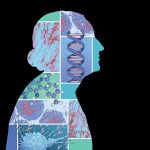 Interaction + Infrastructure = Innovations in Healthy AgingSalk formula recalculates aging research, shifting focus to overall resilience and health span.
Interaction + Infrastructure = Innovations in Healthy AgingSalk formula recalculates aging research, shifting focus to overall resilience and health span. Professor Jan Karlseder named Salk’s Chief Science OfficerOn February 1, Jan Karlseder started as Salk’s new senior vice president and chief science officer (CSO).
Professor Jan Karlseder named Salk’s Chief Science OfficerOn February 1, Jan Karlseder started as Salk’s new senior vice president and chief science officer (CSO). 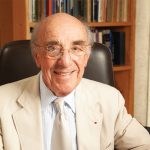 Salk mourns the loss of Nobel Laureate Roger GuilleminThe Institute remembers the “father of neuroendocrinology” for his many contributions to science and friendship to all.
Salk mourns the loss of Nobel Laureate Roger GuilleminThe Institute remembers the “father of neuroendocrinology” for his many contributions to science and friendship to all.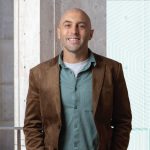 Daniel Hollern–Turning a cancer diagnosis into a career in basic researchAssistant Professor Daniel Hollern pivoted his career trajectory after a family member’s life-changing diagnosis pushed his already-curious mind off a cliff of questions—starting with, “What can I do to help him?”
Daniel Hollern–Turning a cancer diagnosis into a career in basic researchAssistant Professor Daniel Hollern pivoted his career trajectory after a family member’s life-changing diagnosis pushed his already-curious mind off a cliff of questions—starting with, “What can I do to help him?” Jerry Sheehan–Collaborating shoulder to shoulder with scientistsWhen you think about a person who heads an information technology department, you might not envision them working shoulder to shoulder with research scientists. But that’s exactly the approach Jerry Sheehan is taking as Salk’s new chief information officer (CIO).
Jerry Sheehan–Collaborating shoulder to shoulder with scientistsWhen you think about a person who heads an information technology department, you might not envision them working shoulder to shoulder with research scientists. But that’s exactly the approach Jerry Sheehan is taking as Salk’s new chief information officer (CIO).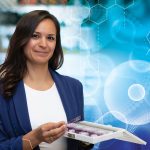 Laura Mainz–Taking control after a cancer diagnosisLaura Mainz grew up in a tiny village in midwestern Germany, with just as many cows as people. But the sweeping landscape speckled with farms never swayed her toward plant biology—instead, her interest in the human body grew.
Laura Mainz–Taking control after a cancer diagnosisLaura Mainz grew up in a tiny village in midwestern Germany, with just as many cows as people. But the sweeping landscape speckled with farms never swayed her toward plant biology—instead, her interest in the human body grew.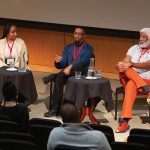 Black Association affinity group cultivates welcoming environmentThe Black Association at Salk (BAS) was one of the first affinity groups formed at Salk in 2020. Since that time, it has established itself as a welcoming space and go-to for resources for all Black Salk community members.
Black Association affinity group cultivates welcoming environmentThe Black Association at Salk (BAS) was one of the first affinity groups formed at Salk in 2020. Since that time, it has established itself as a welcoming space and go-to for resources for all Black Salk community members.



















































